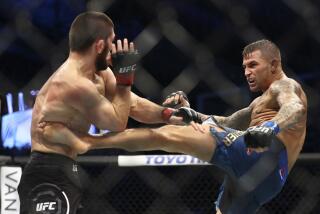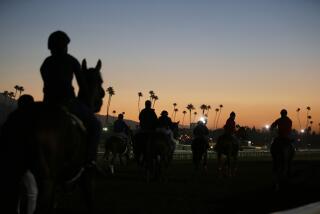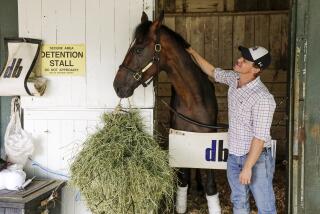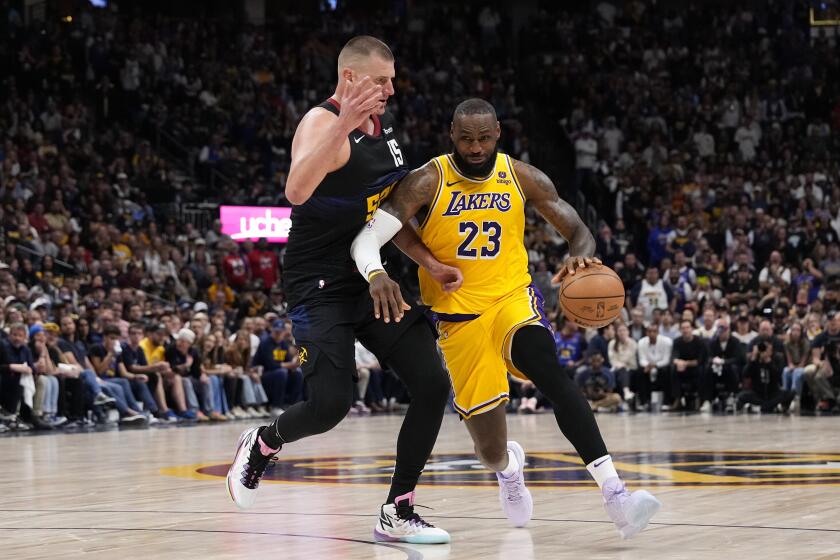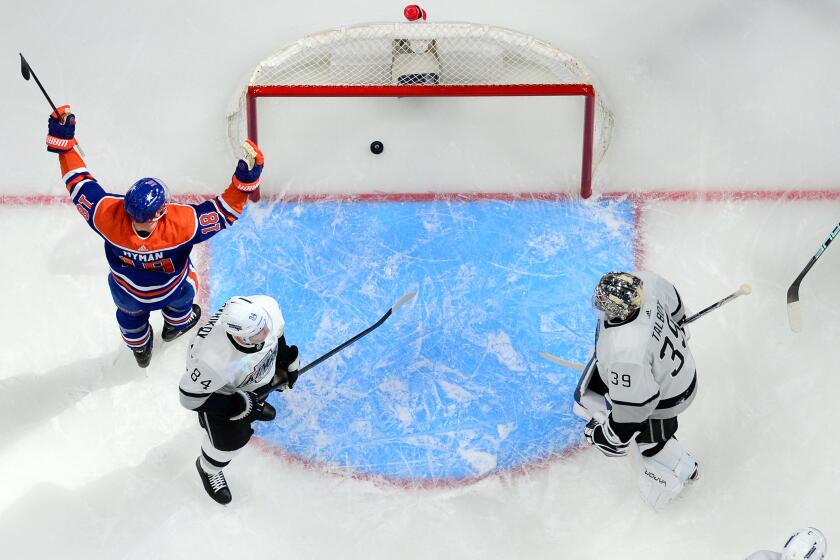Ultimate Fighting Championship announces rigorous anti-doping policy
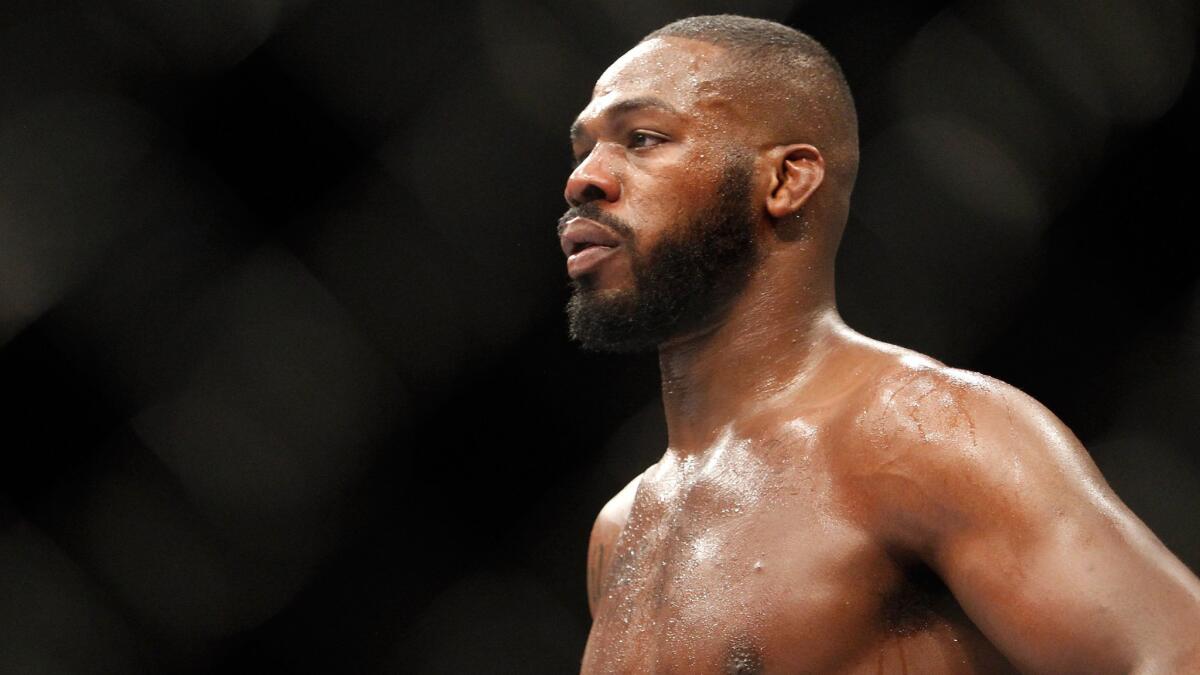
Reeling from positive drug tests by two of its top fighters, the Ultimate Fighting Championship will employ by July a rigorous testing strategy to catch cheaters.
“The No. 1 goal is to have a clean sport, no matter what it costs,” UFC Chairman Lorenzo Fertitta said Wednesday at a news conference in Las Vegas.
Fertitta said the UFC’s investment in testing will spiral from $500,000 in 2013-14 to “several million dollars. … Whatever it is, it is.”
The UFC, said Fertitta, will also join with a third-party testing agency, perhaps the U.S. Anti-Doping Agency or the Nevada-based Voluntary Anti-Doping Assn., to establish a robust testing system.
The plan, he said, is to conduct mandatory in-competition testing for all 585 fighters, along with out-of-competition testing for the duration of fighters’ training period and random tests for marquee fighters, such as champions and top contenders, who don’t even have a bout scheduled.
In what he says should be “a call-out to all fighters,” Fertitta said he’s out to “rid the sport of performance-enhancing drugs” and is considering following the World Anti-Doping Agency code standard that bans an athlete from competition for four years after one positive drug test.
“Four years is career-threatening,” UFC President Dana White said. “If you can’t compete with your natural abilities, we don’t want you here.”
White called the presence of performance-enhancing drugs in mixed martial arts “incredibly dangerous” and admitted the current threat of a nine-month ban for one positive test was ineffective.
The response follows Jon Jones’ positive test for cocaine on Dec. 4, a result that was deemed to have occurred out-of-competition and not revealed until after the UFC drew an estimated 750,000 pay-per-view buys for a Jan. 3 bout between Jones and Daniel Cormier.
Although the UFC knew of Jones’ result as early as Christmas Eve, officials let the fight proceed because the cocaine was tested for inadvertently and because the World Anti-Doping Agency code doesn’t call for a suspension in cases of street drugs being found during out-of-competition screening.
After Jones’ saga, former longtime UFC middleweight champion Anderson Silva, whom White has called the top fighter in UFC history, twice tested positive for steroids -- once before and once after his Jan. 31 main event in Las Vegas against Nick Diaz. That fight drew a reported 600,000 pay-per-view buys.
The Nevada State Athletic Commission’s failure to attach a rush request on Silva’s Jan. 9 sample was followed by a delay at the lab that didn’t bring the positive result to the UFC’s attention until Feb. 3.
“How is this just coming in now?” White said he wondered inside UFC offices.
In opening remarks, Fertitta said, “Simply put, we can do better.”
The UFC slapped Jones with an internal $25,000 code-of-conduct fine after he earned more than $1 million for his victory by unanimous decision over Cormier, then spent one night in a drug-treatment facility, reporting he was told he was not an addict.
Silva’s fate will be determined by the Nevada commission.
“No fighter is worth the integrity of this sport,” White said after explaining how the Silva result was delayed. “There’s a long way to go before we think of Anderson’s next fight.”
Another high-profile fighter, welterweight contender Hector Lombard, tested positive for performance-enhancing drugs and was scratched last month from a scheduled main event against Canada’s Rory MacDonald.
White told reporters MacDonald will get a July 11 title shot in Las Vegas against welterweight champion Robbie Lawler, who, along with middleweight champion Chris Weidman, told Fertitta and White they applaud a new, thorough testing plan.
Criticism of the UFC’s handling of PEDs heightened when former welterweight champion Georges St-Pierre relinquished his belt following a November 2013 title defense and later told reporters he was unsatisfied with the company’s commitment to rooting out cheaters.
White on Wednesday said he believes some fighters have taken a “risk vs. reward” mentality to using drugs. Silva earned a guaranteed $800,000 for his victory.
“I don’t know if there’s an epidemic, but there’s a problem,” White said. “When there’s money involved, people are going to find a way … to get that edge.”
Twitter: @latimespugmire
More to Read
Get our high school sports newsletter
Prep Rally is devoted to the SoCal high school sports experience, bringing you scores, stories and a behind-the-scenes look at what makes prep sports so popular.
You may occasionally receive promotional content from the Los Angeles Times.
